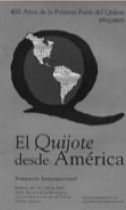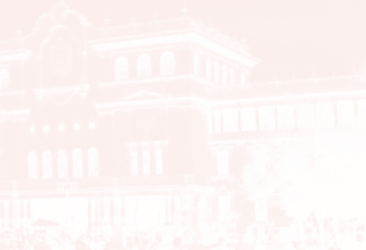Introduction: Bush Administration Policy
A View toward Latin America

Photo by Luis Molina-Pantin.
“So it is the policy of the United States to seek and support the growth of democratic movements and institutions in every nation and culture, with the ultimate goal of ending tyranny in our world.” Thus spoke President George W. Bush during his Second Inaugural Address. As we contemplate this president’s second term, consider whether his first term’s policies toward Latin America echo the elements of this extraordinary sentence. By affirming universalist principles, the president commits his administration to the support of democratic movements and institutions but in the process deliberately downplays the possible importance of context, subtleties or historical trajectories.
The president’s clarion call also suggests a fully transparent foreign policy that will match words and deeds. Thus, a first question to be raised focuses on the first term’s policies toward democracy in Latin America: were they consistent and universalist? A second question is whether transparency marks administration policies clothed in pro-democracy language. The third question steps outside the “democracy basket” to ponder whether an universalist and transparent thrust generally characterized Bush administration policy toward the Americas in issue areas other than democracy.
Beginning in the second term of Ronald Reagan’s presidency, the United States developed an impressive policy in support of democracy in the Americas. This policy endured, notwithstanding changes of incumbent and political party in the White House. Although democratic institutions were not defended with equal vigor, efficacy or success in every instance, the general direction of U.S. policy was clear and for the most part successful through three otherwise quite different U.S. presidents.
THE BUSH ADMINISTRATION’S POLICIES REGARDING DEMOCRACY
The incumbent’s president record with regard to the defense of democratic institutions in the Americas is mixed, however. In April 2002, a coup attempt sought to overthrow Venezuela’s President Hugo Chávez. Some allege that the U.S. government supported the coup. The administration itself protests that it did not. Unfortunately, if one is to believe the administration, the inescapable conclusion is that the U.S. government at this time behaved with stunning ineptitude, incapable of communicating its pro-democracy views to just about anyone and unable to dispel widespread contrary impressions.
Almost two years later, the Bush administration took a leading role in deposing Haiti’s constitutional President Jean-Bertrand Aristide. Aristide was not a good president. But President Bush’s father behaved quite differently when a military coup first overthrew Aristide: in 1991 the United States supported Haiti’s constitutional government, even if headed by a bad president. In early 2004, the U.S. government publicly and strongly pushed Aristide out, even though Haiti’s government was facing an insurrection led by a diverse group of people, some of whom had been accused of serious crimes. Thus, U.S. actions abetted the rule of the mob to overthrow constitutional government.
The Bush administration not only failed to support constitutional presidents whom it detested but it also failed to support its best allies in the Americas. In 2001, Argentina headed toward a severe financial crisis. The Bush administration did little to help solve any of the problems that the Argentine government faced. The administration’s first Treasury Secretary, Paul O’Neill, went out of his way to undermine and ridicule the Argentine government’s efforts, publicly according Argentina no credit for its remarkable economic performance in most of the 1990s. The fact that Economy Minister Domingo Cavallo—the architect of Argentina’s economic success in the early 1990s—was again attempting to rescue his country from financial meltdown, seemed not to matter. Nor was the Bush administration moved by claims that Argentina’s democracy might not survive a crisis of the foreseeable magnitude. The construction of democracy in Argentina had been slow, painful, and complex—a great achievement of the 1980s and 1990s. The Bush administration did virtually nothing to defend Argentine democracy at this hour of peril. That Argentine democracy has survived is a credit to Argentines—alone.
If you once make a mistake, try and try again to make it one more time—that seemed to be the lesson drawn. In early 2003, Bolivia’s President Gonzalo Sánchez de Lozada faced both a budget shortfall and a serious set of entangled social, economic, and political problems. He asked the U.S. government for budget support; he received a laughably insignificant sum. Sánchez de Lozada warned the Bush administration that his government might fall if such aid were not forthcoming. His government did fall for various reasons, as riots and street protests compelled the president to resign—the lack of U.S. support was no help. Yet Sánchez de Lozada was probably the Latin American president whose policies were closest to Washington’s virtually across the board.
Less important but still characteristic of Bush administration policies have been the behavior of its embassies at key junctures. In the last Bolivian presidential election, the U.S. ambassador publicly denounced one of the presidential candidates, Evo Morales, leader of the coca growers. Morales’ popularity surged, putting him within a whisker of winning the presidential elections. In El Salvador in 2004, U.S. officials spoke out during the presidential campaign against the leading opposition party, the Farabundo Martí National Liberation Front (FMLN). The U.S.-preferred candidate won the election. This intervention in the campaign was, however, unnecessary, because the winning government party was perfectly capable of advancing its own interests. The intervention was probably adverse to democracy, however, by sending the signal that Washington was unwilling to let Salvadorans construct democracy on their own.
The Bush administration’s record regarding democracy is not entirely negative, fortunately. The U.S. government played a constructive role during Brazil’s 2002 presidential election, supporting an agreement between the International Monetary Fund and the Brazilian government and opposition. That agreement allowed the Brazilian left, for the first time ever, to win the presidency. Similarly in 2004, the Bush administration adopted a hands-off policy in Uruguay’s presidential elections, won also for the first time ever by the left. At times of crisis, the Bush administration supported the governments of Peru and Ecuador, and it has provided impressive support to the constitutional government of Colombia.
On balance, therefore, the record is mixed. The Bush administration seems as likely to foster as to retard democratic processes in the Americas. May the president take seriously his own words from his Second Inaugural Address, and may his second term provide consistent support to democrats in Latin America, not excluding—as in Argentina and Bolivia in the first term—the best friends that the United States has had in the region.
THE TRANSPARENCY OF BUSH ADMINISTRATION PRO-DEMOCRACY POLICIES
U.S. policy toward Cuba has been clothed in the language of democracy promotion. No other U.S. policy toward Latin America—and, outside Iraq, perhaps in the world—is as transparently pro-democracy as U.S. policy toward Cuba. But, is it?
In fact, Bush administration policy toward Cuba is not what it seems to be. From public rhetoric, we would infer that there is nothing but relentless hostility between the U.S. and Cuban governments. And yet, it is during this Bush administration that the first significant breach of the decades old U.S. trade embargo on Cuba occurs. Since late 2001, the United States has become Cuba’s principal source of imported agricultural products. Moreover, President Bush without fail has suspended the implementation of Title III of the Helms-Burton Act—the segment of the law designed to prevent international firms from trading with or investing in Cuba—leaving that seemingly draconian law virtually toothless. The U.S. and Cuban governments have very good professional military relations in the environs of the U.S. base at Guantanamo Bay: both share the interest in preventing prisoners at the base from escaping into Cuba. The Bush administration cheers the Cuban government’s authoritarian will and capacity to prohibit its citizens from emigrating without the Cuban government’s permission; the U.S. government wants the Cuban government to be even more restrictive.
Many U.S. policies toward Cuba that supposedly promote democracy have the exact opposite effect. In mid-2004, the U.S. government made it substantially more difficult for Cuban-origin persons to visit their relatives in Cuba, and thereby communicate to family members in person that the future of Cuba might be different from its past. In effect, this U.S. government decision helps the Cuban government censor information. The same can be said with regard to U.S. regulations that prevent most U.S. citizens who read this article from traveling lawfully to Cuba. U.S. policies that prevent the export of communications equipment such as modems and fax machines to Cuba equally help the Cuban government’s censorship policies. In short, U.S. policy toward Cuba in the name of democracy is opaque and, more importantly, probably adverse to the very goal of promoting democracy.
THE UNIVERSALISM OF BUSH ADMINISTRATION POLICIES IN OTHER ISSUE AREAS
What, then, of the third implication of the Second Inaugural Address, namely, whether—as President Bush once put it—this administration will not do nuance? Is the Bush administration, in areas other than democracy, likely to pursue universalist, even dogmatic policies, or would it display varieties of pragmatism?
The Bush administration’s trade policies toward the region allow us to assess the range of universalist claims. Is the administration consistently and universally in favor of free trade as its words suggest? During his first term, President Bush was the source of an odd innovation within the North American Free Trade Agreement (NAFTA). In announcing sanctions against an array of imported steel products, the president exempted steel producers in Canada and Mexico. NAFTA became a tool to strengthen a protectionist steel cartel.
Bush administration negotiations over a Free Trade Agreement of the Americas (FTAA) similarly demonstrate the retreat from free-trade policies. In late 2003, the FTAA co-chairs, the United States and Brazil, with the support of most other states in the region, issued a framework draft treaty built on the “cafeteria model.” Beyond some very broad principles, in practice states will be allowed to pick and choose which articles of the treaty will apply to them, on what schedule, and to what extent. This transforms the FTAA into a neomercantilist vehicle that permits specialized deals between states, raises transaction costs by generating a maze of rules and procedures to keep legions of lawyers gainfully employed, and most likely will produce more trade diversion than trade creation. This particular design for the FTAA, moreover, stands at odds with the effort to create a truly more universalist approach to freer trade via the so-called Doha Round of the World Trade Organization.
Consistent with its approach to the FTAA, the Bush administration has favored an array of subregional deals, all of which have similar characteristics. The Central American Free Trade Agreement (CAFTA), which the Dominican Republic proposes to join, illustrates another problem. These countries do need ready access to U.S. markets in order to grow. But they lack negotiating clout. CAFTA represents a triumph of U.S. clout but virtually no change on the one basket of issues that would demonstrate a serious U.S. ongoing commitment to free trade: U.S. agricultural subsidy programs remain in place.
CONCLUSION
May President Bush take seriously his Second Inaugural Address in Latin America. Bush administration policies regarding democracy in Latin America were at best inconsistent. In fact, in various countries and circumstances they caused substantial harm and failed to stop damages that might have been prevented or mitigated. Some Bush administration policies in the name of democracy, as in Cuba, were neither transparent nor effective and, indeed, were adverse to the very goals that the U.S. government proclaimed. Moreover, the universalist thrust implicit in the president’s Second Inaugural had been systematically undercut in the administration’s trade negotiations in Latin America. May the president, therefore, be true to his word during his second term: Don’t do nuance. Support free trade. Support democracy. May your deeds match your words.
Spring/Summer 2005, Volume IV, Number 2
Jorge I. Domínguez is the Director of the Weatherhead Center for International Affairs at Harvard University and a member of the DRCLAS Executive Committee. The Clarence Dillon Professor of International Affairs at Harvard, he is the author and editor of various books on Latin America, including Mexico’s Pivotal Democratic Election: Candidates, Voters, and the Presidential Campaign of 2000, The Cuban Economy at the Start of the Twenty- First Century, and The United States and Mexico: Between Partnership and Conflict.
Related Articles
International Symposium in Puebla
It is likely that Don Quijote first reached the Western hemisphere—in what was, at the time, lightning speed—as a stowaway. On September 28, 1605, Franciscan commissioners of the…
Adiós 61 Kirkland
For the past eight years, the David Rockefeller Center for Latin American Studies has made its home at 61 Kirkland Street. Countless film screenings, celebrations and roundtable discussions…
DRCLAS and IDB Launch Book Series
The Inter-American Development Bank (IDB) and DRCLAS have signed an agreement to create the “Latin American Development Series,” a peer-reviewed English-language books series on…




